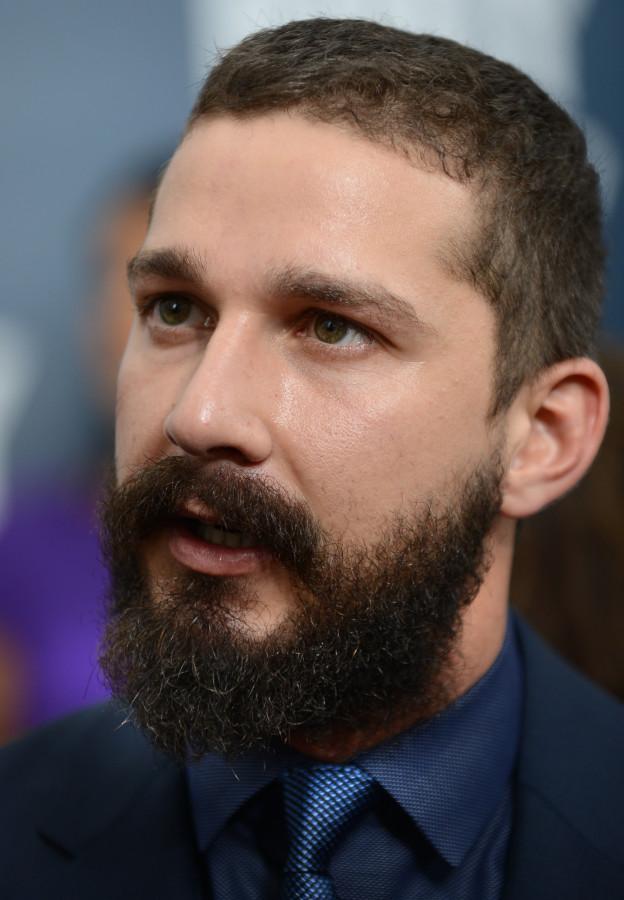There are two conceptions of Shia LaBeouf circulating the United States right now: failed nutty “artist” (albeit an entertaining one) and transitioning star-turned-artist with a serious message. I side with the latter. However unpopular the opinion, Shia LaBeouf is doing important work right now.
What we as millennials understand of public life is constantly validated by the ‘me’-ness of social media and the consequent normative narcissism of human nature. Becoming famous is so easy relative to the speed at which witty quips, poems, idioms or personalities flow out of our thumbs and into the Twittersphere. The problem is that there are few people (besides our exasperated parents) who will tell us that ‘celebrity’ is not always a state of being to aspire to.
Enter Shia LaBeouf. The lovably comedic child actor, like many of his kind before him, had been publicly scrutinized in the tempestuous transition from child to adult — from, say, “Holes” to “The Greatest Game Ever Played.” Luckily for him, the transition seemed smooth. Blockbusters like “Transformers” and “Disturbia” cemented him in Hollywood.
The profile could have easily ended there. LaBeouf could have found a very successful and lucrative place in cinematic canon for the rest of his foreseeable life. In every regard, in young LaBeouf we were looking at the next Gyllenhaal, Gordon-Levitt, or, dare I say it, DiCaprio.
Yet he aspired to more.
I think most LaBeouf criticism followed his decision to not fit the model of the supremely successful, relatively tame Hollywood actor. “Why?!” we yelled at our computers when he pulled his “I am not famous anymore” bag-head stunt at the premiere of “Nymphomaniac: Vol. I.” We blanched at the plagiarism scandal preceding this. The piece of “performance art” where LaBeouf sat silently in a room while fans asked/said whatever they wanted at him looked like raw insanity. What at first seemed like a downturn for the rising star started to seem more and more like a complete breakdown. He was a funny blurb yelling emphatically, “JUST DO IT.” An existential crisis on America’s main stage. The implosion of a dying star. The end, like a Bynes, a Lohan or a Trump, seemed imminent.
Little Louis Stevens stuck around, though. Last week he put on another performance piece known as #ALLMYMOVIES, where the actor-artist filmed himself sitting in a theater for 58 consecutive hours watching all of his movies in reverse chronological order. The memes are incredible. Shia is at times elated, indifferent, bawling or sleeping. More than answering the question we’ve all asked ourselves at some point — do movie stars watch their own movies? — this marathon provided an insight into the very psychology of celebrity.
I’ll come out and say it. I think LaBeouf’s breakdown and rebirth via a three-day theater-baptism/resurrection is indicative of some very deep-seeded social anxieties developing in the American youth. Whereas LaBeouf is unable to accept the status with which he’d been compartmentalized, millennials are uncomfortable with the social dynamics our parents’ generation inadvertently subjects us to (talk about a sweeping statement).
Taken to the extreme, an argument could be made that if this wasn’t happening to LaBeouf, it’d be happening to somebody else. By the very nature of the state of society, anxiety is unnaturally high and identity is at its most vulnerable. I mean, you don’t have to look very far to watch James Franco doing much of the same work. He’s an Oscar-nominated actor who fails to fit a single paradigm for that elite group.
Whatever you consider a successful critique of celebrity, nothing gets more postmodern than publicly binge-watching your own movies. Almost nothing signifies social anxieties more than the public breakdown of a man who refuses celebrity by begging not to have it anymore. This begs the question — is LaBeouf protesting the social mores of post-Cold War demand for routine and category effectively? Is he even aware of the irony and artistry of his public rejection of celebrity? Yes and yes. I can hardly think of a more conscientious person than LaBeouf, whose apology for plagiarizing the work of graphic artist Daniel Clowes was also apparently plagiarized. As LaBeouf says in a freestyle rap on YouTube (highly suggested), “My philosophy is much farther than your eyes can see.”
On exiting the movie theater last week in Manhattan, LaBeouf said he walked out loving himself. He and I are certainly on the same page.


